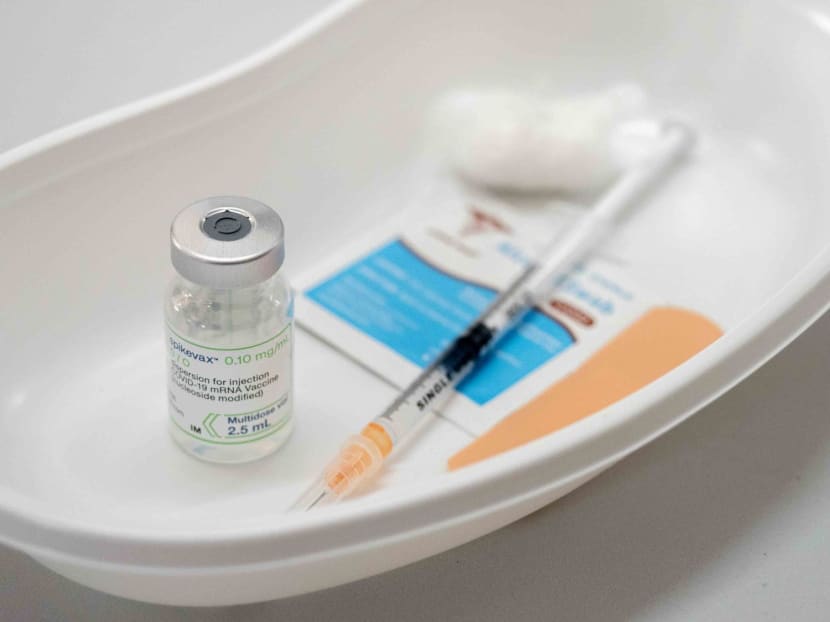People aged 60 and above, medically vulnerable persons urged to get bivalent vaccine boosters amid rising Covid-19 cases
SINGAPORE — With a surge of Covid-19 and hospitalisation cases in recent weeks, people aged 60 and above, as well as medically vulnerable persons, are strongly advised to get the updated bivalent vaccine booster at around one year after their last booster dose.

A vial of the Moderna-Spikevax bivalent Covid-19 vaccine.
- People aged 60 and above, and medically vulnerable persons, are urged to get the updated bivalent vaccine booster at around one year after their last booster dose
- They can start to receive it from five months after their last booster dose
- The expert committee on Covid-19 vaccination noticed that hospitalised Covid-19 patients were more likely to not be updated with their vaccinations and had not yet received a bivalent vaccine dose
- There is an ongoing surge of Covid-19 cases in recent weeks, resulting in more hospitalisations
SINGAPORE — With a surge of Covid-19 and hospitalisation cases in recent weeks, people aged 60 and above, as well as medically vulnerable persons, are strongly advised to get the updated bivalent vaccine booster at around one year after their last booster dose.
They can start to receive it from five months after their last booster dose.
In a press statement on Monday (May 22), the expert committee on Covid-19 vaccination under the Ministry of Health (MOH) said that hospitalised Covid-19 patients were more likely to not be updated with their vaccinations and had not yet received a bivalent vaccine dose.
A substantial number had not completed vaccinations even for minimum protection.
“These hospital admissions could potentially have been prevented by vaccination.”
The minimum protection one receives from these vaccines continues to be sustained against severe disease for more than one year, the committee said.
It also said that the bivalent vaccine boosters provide better protection against the Omicron strains, which have caused the recent surge of Covid-19 cases.
The bivalent vaccines, which are the messenger ribonucleic acid (mRNA) vaccines produced by pharmaceutical firms Pfizer-BioNTech and Moderna, contain components from the original Sars-CoV-2 coronavirus, as well as its Omicron strains that target the pathogens.
Minimum protection for adults means getting one of the following:
- Three doses of the mRNA vaccines or the Novavax or Nuvaxovid vaccine
- Four doses of the Sinovac-CoronaVac vaccine
People aged 60 and above as well as medically vulnerable persons get the greatest benefit from the bivalent booster dose, which further reduces their risk of hospitalisation and severe disease from Covid-19.
"Covid-19 infection can trigger a worsening of existing conditions and result in severe infection or breathing difficulties, especially in seniors and medically vulnerable persons, particularly in those who have not yet received the updated Covid-19 bivalent vaccine," the committee said.
Vaccination is essential to achieve a good level of protection against severe disease when infected, especially among those aged 60 and above who are significantly more likely to require medical care and hospital admission should they fall ill with Covid-19, it added.
It thus urged these segments of the population to have minimum protection at the very least and to achieve optimal protection by being updated with the bivalent vaccines.
VACCINATION BENEFITS OUTWEIGH RISKS
The expert committee said that although Covid-19 vaccines do carry some risks, the benefits of vaccination far outweigh the risks, since the most common side effects are mild and resolve completely.
“The risk of serious side effects from vaccination is very low, about seven in 100,000 persons locally, and is even lower with the bivalent mRNA boosters.
“In contrast, the risks of severe illness from Covid-19, including breathing difficulties and even death, can be as high as around seven in 100 persons among unvaccinated seniors. Vaccination reduces the risk of severe illness by more than 80 per cent.”
The committee urged all eligible persons to get vaccinated for minimum protection.
Those aged 60 and above, and medically vulnerable persons, who have attained minimum protection should receive one booster dose of the updated bivalent vaccine at around one year after their last booster dose.
They can start to receive it from five months after their last booster dose.
“The protection from the 2023 bivalent booster dose will reduce the risk of severe disease, worsening of their underlying medical conditions and hospitalisation, particularly during the Covid-19 surge locally and in the region,” it added.








